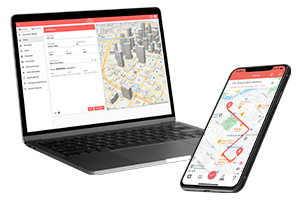Last updated on: January 6, 2022
It is not widely known what information the IRS has access to in general and what information they are looking for when conducting an IRS Audit (e.g. Mileage). Yet it is worth knowing that the IRS can track down Business expenses and is able to reconstruct a taxpayer’s Daily Route from Parking fees, Tolls, or Vehicle inspection reports. Switching to apps from manual data recording when preparing your tax return documents might be a smart move to make in 2022.
What records can the IRS access?
The IRS has access to all other government (Federal and State) systems, which means they have access to DMV (Department of Motor Vehicles) records. Therefore odometer readings recorded at the Mechanic or during Vehicle Safety Inspections, Traffic cams, Tolls, Fees are all accessible to IRS Employees. Taxpayers have to make sure that said data matches the locations in their Mileage logs.
When somebody receives more than $10 of interest in a bank account during the year, the bank has to report that interest to the IRS. If a taxpayer has Investment Accounts, the IRS can see them in dividend and stock sales reportings through Forms 1099-DIV and 1099-B.
There’s more to come
The so-called American Families Plan will require banks and other financial institutions to report more than just a taxpayer’s interest earned, capital gains, and losses. These institutions would also be required to report aggregate account outflows and inflows. This means that the IRS will know about all of a taxpayer’s bank accounts, whether they earned income on that account or not, they will have information about how much money is in each of the bank accounts in a given year, and how much was transferred in and out of the accounts.
In other words, it will be easier for the IRS to find contradictions (if there are any) in the forms and supporting documentation they require taxpayers to submit when filing their tax returns. So taxpayers and accountants alike have to pay extra attention from now on. Estimated, rounded numbers, improperly filled forms won’t do anymore.
Switch to an IRS-Proof Mileage Tracker App
Forms and documents need to be checked for internal validity, they cannot contain contradicting or estimated data and information. The more detailed and accurate the supporting documents are, the less likely that you will get penalized. To do this, switch from a paper-based tax return and document preparation to software-based administration. This will save you time and ensure the quality of the documents you produce. There are software solutions on the market purposefully developed for this reason.
For example, MileageWise has developed and inserted an AI-based feature into their Mileage Logging Software, which checks finished documents, and offers an improved Mileage log draft that takes into account the user’s habits and pre-set parameters. The program auto-populates your former trips and will also check and correct 70 logical conflicts in the Mileage log to ensure that the content is IRS-compliant. This way internal contradictions can be avoided.
These functions are real lifesavers when Retrospectively Reconstructing your Mileage logs, as the software can complete even hopelessly deficient Mileage logs quickly, meeting Every Expectation.
If you would like to comply with the IRS try MileageWise without obligation!




